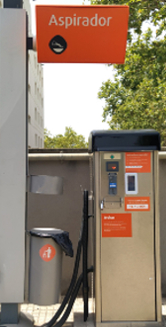What is a POS and what is its Purpose?
Published on 06/11/2023 by Miriam Roselló Vazquez

In the business world, it’s essential to keep up to date with technology and management solutions that can streamline your company's operations. One of these technological advancements is the POS or Point of Sale Terminal. In this article, we will explore in detail what a POS is and how it can be a valuable tool for your business, in addition to highlighting the advantages of using a POS.
The Point-of-Sale terminal or POS is an essential electronic device in the business environment that allows sales to be managed in a unified way, efficient transaction processing and handling. It’s a system that combines hardware and software to facilitate and streamline the payment process for customers. POS systems are commonly used in retail stores, restaurants, hotels and other businesses that require payment transactions with their customers.
Functionalities of a POS
A POS system offers a variety of functionalities that simplify the sales process and provide a seamless experience for both merchants and customers. Some of the main functionalities of a POS system include:
- Inventory Management
- Transactions and Payment Processing
- Receipt Generation
- Customer Management
Types of POS systems
There are different types of POS systems that adapt to the specific needs and size of each business. Below are the most common POS systems in the market:
- Physical or Traditional POS
- Mobile POS
- Virtual or Online POS
Advantages of Using a POS
The use of a POS system offers a range of advantages for both merchants and customers. Below, we'll detail some of the main benefits of using a POS system:
- Agility in the Payment Process: A POS system allows for quick and efficient transactions, reducing user wait times and enhancing customer satisfaction.
- Increased Transaction Security: POS terminals often have built-in security measures for processing payments and protecting customer data, ensuring that users' financial information is protected.
- Better Inventory Management: With a POS, merchants can keep an up-to-date record of inventory, enabling them to place orders and restock products promptly.
- Enhanced Customer Experience: The speed and efficiency of transactions thanks to a POS system improve the customer experience, which can lead to higher satisfaction and loyalty.
- Multiple Contactless Payment Solutions: A POS not only accepts payments via bank card, also accepts mobile payments through Apple Pay or Google Pay, QR code payments, tags and NFC devices.
- Report Generation and Data Analysis: A POS system provides detailed data on sales, product performance and other aspects of the business in real time, allowing merchants to make informed decisions to improve their operations.
In summary, a POS system is an essential device in the business environment that facilitates transactions and manages payments efficiently. It offers a variety of functionalities that simplify the sales process and provide a seamless experience for both merchants and customers. With different types of POS systems available, merchants can choose the option that best suits their needs and improve their business management.
Integrating the Orain IoT Payments Pro POS with the Orain Management System allows you to offer multiple payment options to your customers, control stock, detailed reports on all transactions at the point of sale, optimise daily operations, resolve incidents and automatic refunds, and much more. Discover our products and choose the payment system that best fits your business needs!
Contact us
Orain has been present at Venditalia 2024
Publicado el 20/05/2024
Discover the News and Updates of the Orain Mobile App!
Publicado el 16/04/2024
Benefits of Implementing Vending for Business
Publicado el 22/03/2024
Manage Contactless Payments comprehensively at Service Stations with Orain
Publicado el 14/03/2024
The Rise of Minimarkets: What They Are and Their Advantages
Publicado el 06/02/2024





